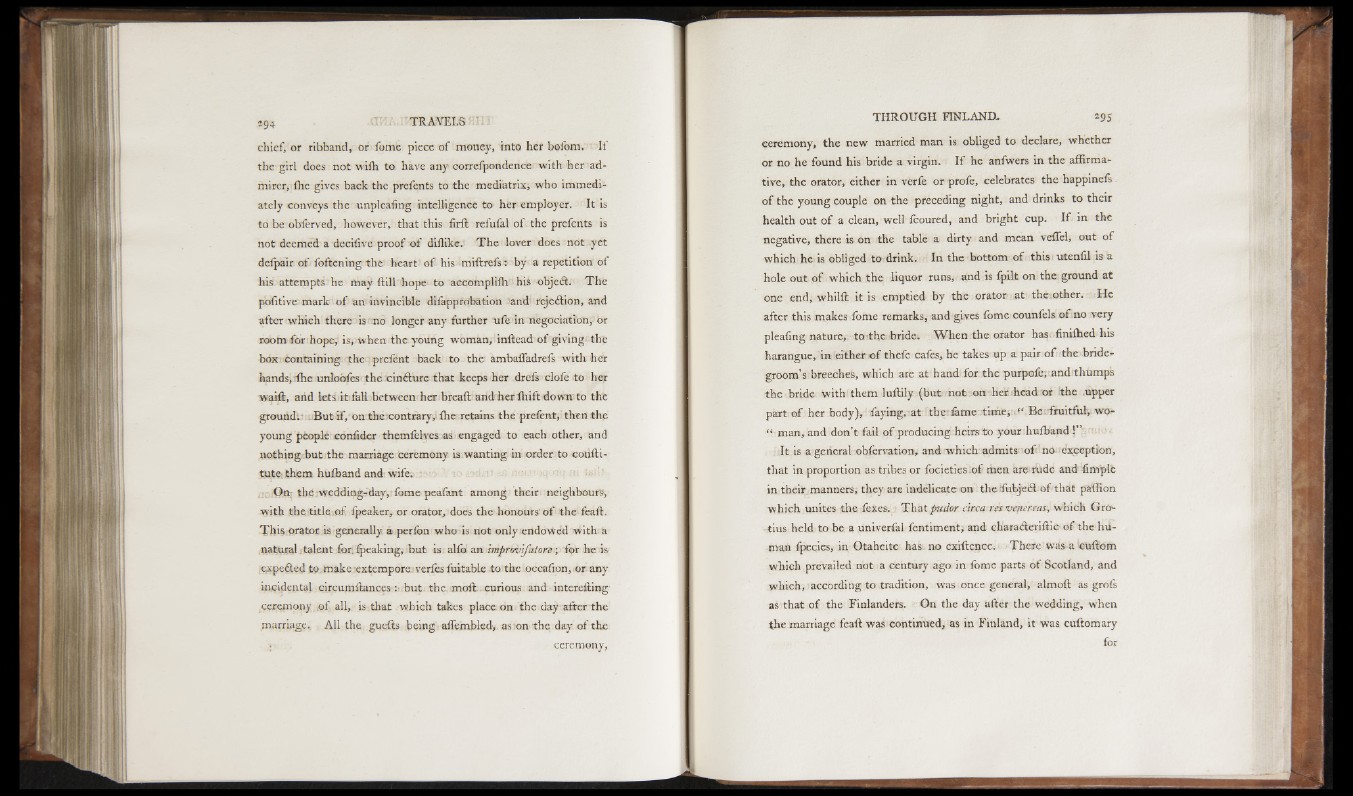
chief, or ribband, of fome piece o f money, into her bofom. I f
the girl does not wifh to have any correfpondence with her admirer,
ihe gives back the prefents to the mediatrix, who immediately
conveys the unplealing intelligence to her employer. It is
to be obierved, however, that this firft refufal o f the prefents is
not deemed a decilive proof o f diflike. T h e lover does not yet
delpair o f foftening the heart o f his miftrefs: by a repetition o f
his attempts he may ftill hope to accompliih his objeti. T he
politive mark i of an invincible difapprobation and rejection, and
after which there is~no longer any further ufe in negotiation/¡or
room for hope,: is, when the young woman, inftead o f givings the
box Containing the prelent back to the ambaifadrels with her
hands, ifhc unloofes the cintiure that keeps her drels clofe to her
waift, and lets it fell between her breaft and her iliift down to the
ground.- But if, on the contrary, Ihe retains the prelent, then the
young people conlider themfelves as engaged to each other, and
nothing:but;the marriage ceremony is wanting in order to conlti-
tuteithem huihand and- w ife, a
On the ;wedding-dayy fome peafant among their neighbours,
with the title .of fpeaker, or orator, does the honours'of the’ feaft.
Thi^ orator is generally a perlbn who is not only endowed with, a
natural;talent for.fpeaking, but is; allb an improvifatore y for be is.
.expetied to make extempore verfesfuitable to thc occafion, or any
incidental circuroftances : but the imoft curious and interefting
ceremony ,of all, is that which takes place on the day alter the
marriage.. All the guefts .being allembled, as ton the day o f the
ceremony,
ceremony, the new married man is obliged to declare, whether
or no he found his bride a virgin. I f he anfwers in the affirmative,
the orator, either in verfe or prole, celebrates the happinels
o f the young couple on the preceding night, and drinks to their
health out o f a clean, well Icoured, and bright cup. I f in the
negative, there is on the table a dirty and mean veifel, out o f
which he is obliged to drink. In the bottom o f this utenlil is a
hole out o f which the liquor runs, and is fpilt on the ground at
one end, whilft it is emptied by the orator at the,other. He
after this makes lome remarks, and gives fomecounfels o f no very
plealing nature, to'the bride. When the orator has finilhed his
harangue, in either o f thefe cafes, he takes up a pair o f the bridegroom’s
breeches, which are at hand for the puxpolti andithumps
the bride with them luftily (but .not on-her head or the upper
part.of her body), faying,-at the*feme:time(tsfi. Becftuitfuly wo-
“ man, and don’t fail o f producing heirs to j our hulband !”
It is a general obfervat’ion, and which admits oft no exception,
that in proportion as tribes or focietieslof men afe-nide and fimple
in their manners; they are indélicate on the rfubjeét of-that pâffion
which unites the lexes. That pudor circa res venereas, which G r o
-tius held to be a univerfal fentiment, and charatieriftic o f the hti-
man Ipeqies, in Otahtite has;, no exiftence. There was a cuftom
which prevailed not a century ago in fome parts o f Scotland, and
which, according to tradition, was once general, almoft as grols
as that o f the Finlanders. On the day after the wedding, when
the marriage feaft was continued, as in Finland, it was cuftomary
for